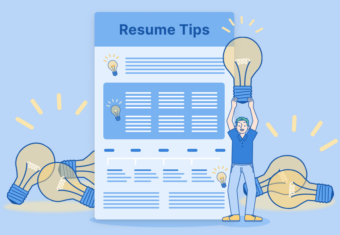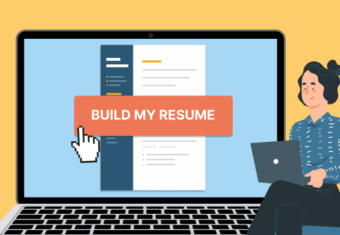Responding to “walk me through your resume” is very similar to how you’d answer “tell me about yourself”, another common introductory question in a job interview.
In both cases, the hiring manager wants to hear a bit about your educational and career history and what makes you want to interview for this position.
To nail this question, keep your response brief and present your background in a way that adds some additional perspective instead of just restating what’s written on your resume.
If you’re answering this as a phone interview question, you’ll need to be especially succinct in your answers since the interview will be shorter than a sit-down interview.
Summarize your educational background
Start walking the interviewer through your resume by giving a brief outline of your educational background. Consider sharing a bit about relevant coursework or projects you completed that relate to the job.
Remember that interviewers are only looking for information that highlights why you’re qualified for the position.
Do:
- Talk about specific accomplishments that show how qualified you are to do the job.
- Keep this part of the answer short if you’ve been out of school for more than a couple years.
Don't:
- Ramble on about your childhood ambitions or early education.
- Mention every class you’ve ever taken.
Describe your work history
The next part (and arguably the most important) of your resume walkthrough is to explain your work history. If you already have at least a few years of work experience, this will make up the bulk of your response.
Briefly explain how you began your career, and what led you to this point. Focus on how you’ve progressed in your field, and what you’ve accomplished at previous jobs.
When talking about your work history, you should always:
- Use anecdotes that show your passion for the job you’re interviewing for
- Mention accomplishments that prove you have the skills to succeed at the job
- Research the company you’re interviewing at, and use your answer to highlight how your experience makes you capable of tackling the challenges it’s facing
Don’t mention every job you’ve ever held. Only discuss past positions that demonstrate your preparedness to meet the requirements of the job.
Do:
- Use examples that show your passion for the job.
- Mention your accomplishments.
- Research the company you’re interviewing at.
Don't:
- Mention every job you’ve ever held.
- Talk negatively about your previous jobs.
Explain how this job fits into your long-term goals
Finish your answer by discussing how the job you’re interviewing for fits into your long-term career goals.
When talking about your goals, focus on how the company would benefit from you working there, not why the job would benefit you.
Do:
- Show the hiring manager that your personal career goals align with the needs of the company.
- Focus on why the company would benefit from you working there.
Don't:
- Talk about why the job would personally benefit you.
- Ramble about your hopes and dreams.
Employers want to know how you’ll help them achieve their goals and that you’re worth investing in. Showing them that your personal career goals align with the needs of the company is an easy way to convince them that you’d be a strong, long-term employee.
For more ideas on how to make a convincing case for yourself, review sample answers for the “why should we hire you” interview question.
Walk me through your resume sample answer
First, here’s a sample answer to “walk me through your resume” that makes some common mistakes:
Bad example
“I’ve wanted to be a librarian since I was 7, when I used to arrange all of my books at home in alphabetical order. Then, at elementary school, I used to spend my lunch hour in the school library, helping the librarian put books back on the shelves and tidy up. It was just such a lovely, relaxing place to be. I also volunteered in the library at my high school for a few years. At college I majored in Education, and I particularly enjoyed modules on linguistic diversity, ethics and literacy.
In terms of my work experience, I had jobs as a newspaper delivery girl and supermarket cashier in high school, and as a telesales operative and library assistant at college. I’ve been a volunteer at my local community library too.
This job would let me fulfill my childhood dream of working as a professional librarian, and spending my life surrounded by books.”
This candidate spends too much time discussing abstract goals and personal anecdotes. While they are relevant to the target position, they end up distracting from what actually makes the candidate qualified.
Now, here’s an example of what a good answer to “walk me through your resume” looks like:
Good example
“I’ve always been dedicated to a career as a librarian, as you can see from the three years I spent volunteering in the school library during high school. This time spent volunteering gave me practical experience of working with library materials and resources, and even using library software like Lucidea Integrated Library Systems. In college, I majored in Education because I knew I wanted to work as a school librarian, and understood this degree would give me the knowledge needed to work with children in a school and classroom setting.
I also worked as a library assistant in college, which helped me learn about the customer-facing side of a librarian’s role. Since then, I’ve volunteered in my local community library, where I had the chance to develop a new, cost-efficient cataloguing and returns system. I’m sure this system could benefit the program here at Smith High School, given the budget cuts that schools in the district are facing.
Working at Smith High School would allow me to fulfill my ambition of making a real difference as a school librarian. It would let me put into practice my knowledge of running a library efficiently and cheaply, as well as giving me the chance to turn the library into a welcoming space to help students achieve.”
This candidate not only makes a strong case for why they’re qualified for the target position, but they also demonstrate how they can help the school respond to budget cuts.
When preparing a sample answer for “walk me through your resume”, be sure to review why are you suitable for this job sample answers as well. This will help you start your interview off strong.
Additional interview resources
Here are a few other resources you can use to help you face your interview with confidence:
Click to rate this article
4.5 Average rating














